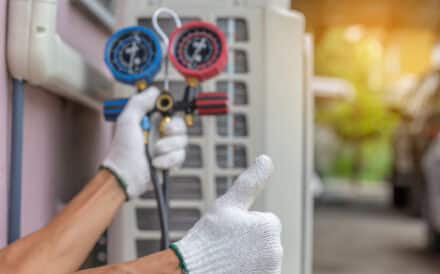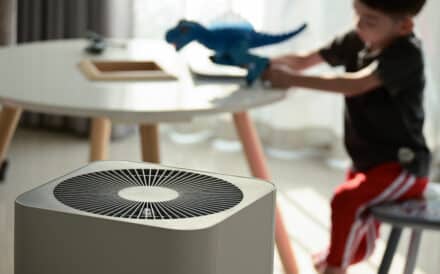Preparing Your HVAC System for Extreme Weather Events
Extreme weather events have been increasing in frequency and intensity across the country, affecting not only our outdoor time but also the comfort and safety of our indoor environments. From wildfires and extreme heat to powerful storms and unexpected power outages, inclement weather can put added strain on our heating and cooling systems. Taking proactive steps now can help extend your HVAC system’s lifespan, improve energy efficiency, and ensure your home is always comfortable no matter what extreme weather rolls your way. Here’s how to prepare your HVAC system to handle anything Mother Nature throws.
How Do Extreme Weather Events Affect My HVAC?
Your HVAC system is one of the hardest-working appliances in your home, especially during extreme weather events. When temperatures soar into the triple digits, your air conditioner runs almost nonstop to keep your family cool. During freezing cold spells, your furnace has to work around the clock to keep your space cozy. Meanwhile, storms can bring their own challenges, like high winds that can damage outdoor units and power outages that can leave your entire system vulnerable.
If your HVAC unit stops working during extreme weather, your home can quickly move into uncomfortable territory and even become unsafe. That’s why a little preparation goes a long way in ensuring your system stays running when needed. Here are six ways to ensure your system is up to the task.
1. Regularly Replace Your Filters
Your system’s air filters are easy to maintain, but they’re often neglected. And make no mistake: clean air filters are pivotal for efficiency and indoor air quality, especially during extreme weather events when your system runs more frequently. Clogged filters force your system to work harder, increasing energy costs and potentially leading to breakdowns.
- Check filters monthly during peak seasons when your system is working overtime.
- Grab a few extra filters to keep on hand, so you’re not caught empty-handed when you need a fresh one.
- Plan to change standard filters every 1-3 months, or more often if you have pets or allergies.
- Consider upgrading to high-efficiency filters for better air quality and system performance.
Replacing dirty filters is a simple five-minute task that can save hours of system strain and keep repair technicians away during the most extreme weather conditions.
2. Protect and Clean Your Outdoor Unit
From the blistering sun to the pouring rain and everything in between, your outdoor AC unit sits there day after day, handling whatever weather comes along. Helping it stay in good shape is easier than you might think:
- Sweep away leaves, twigs, and debris that pile up around the unit, as they can block airflow and make your system work harder.
- Give your unit some breathing room by trimming back bushes and plants at least two feet from all sides.
- Walk around your unit now and then to look for loose panels or visible damage before they become bigger problems.
- During storm season, consider adding a mesh cover to keep debris out (just remember to take it off before you turn on the system!).
- Living in a flood-prone area? Consider raising your outdoor unit on a concrete pad to keep it above rising water levels.
3. Optimize Your Thermostat
Giving your thermostat smart instructions can help your entire HVAC system work better during extreme weather events.
- During heat waves, give your AC a break when you’re not home by setting the temperature a few degrees higher, then cool things down before you return.
- During cold weather, keep temperatures steady rather than turning the heat way down and back up. This can help prevent pipes from freezing or accidentally overtaxing your HVAC system.
- Consider upgrading to a smart thermostat that learns your schedule and adjusts to weather conditions automatically. Smart thermostats help your system run more efficiently and can even help lower monthly energy costs.
- Keep some backup batteries for your thermostat to maintain your settings during a power outage.
With the right settings, you can decrease unnecessary cycling and help your unit manage extreme temperatures more effectively.
4. Seal and Insulate Your Home
Even the best HVAC system will struggle in a home that isn’t sealed properly. Think of proper sealing and insulation as giving your system a fighting chance against outdoor extremes:
- Run your hand around your window and door frames to check for drafts. If you feel air, it’s time for some weather stripping.
- Inspect your attic. If you can see the joists, adding more insulation can make a huge difference in comfort.
- Ask us about checking your ductwork. Leaky ducts are like having a hole in your wallet, letting your comfort (and money) escape.
- Don’t forget about exposed pipes. A little pipe insulation can prevent expensive freeze damage during cold snaps.
While these improvements are key during extreme weather events, they can also help reduce strain on your HVAC system and lower your energy bills.
5. Know When to Call A Professional
Even with your best efforts to prepare, extreme weather events can sometimes have other plans for your HVAC system. Keep an eye (and ear) out for these signs that it’s time to give us a call:
- If you hear strange noises coming from your system — any type of banging, whistling, or grinding sound isn’t normal and shouldn’t be ignored.
- If you’re grabbing a blanket in one room and sweating in the next, that’s a sign of uneven temperatures and usually means your system is struggling.
- If your system is cycling on and off repeatedly.
- If you smell unusual odors coming from your vents or the unit itself.
- If you’re adjusting your thermostat, but nothing seems to happen in response.
- If you spot water or leaks around your indoor unit.
Catching these issues early can save you from an insufferably warm home during a heat wave or having to pile on layers and blankets during an unexpected freeze. And that’s something everyone in the household will appreciate!
Stay Comfortable Through Any Weather
At Silver State, we understand how crucial your HVAC system is during extreme weather events. Our experienced technicians can help prepare your system for peak performance, no matter what conditions you face. From routine maintenance to emergency repairs, we’re here to ensure your home stays comfortable and safe.
Contact us today to schedule your maintenance visit or to learn more about our Club Membership plans.




